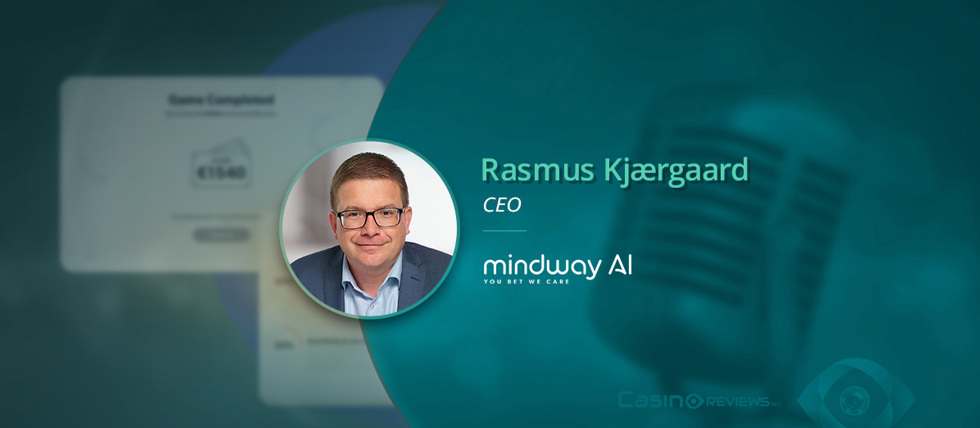AI, Neuroscience, and Expert Human Analysis: An Inside Look at Mindway AI with Rasmus Kjaergaard

In this exclusive interview, we speak with Rasmus Kjaergaard, the CEO of Mindway AI, a safer gambling software provider. Mindway AI offers innovative AI solutions to identify and prevent problem gambling, working with gambling operators and industry organizations to improve player protection. We discuss the company's award-winning software, Gamalyze and GameScanner, and explore how neuroscience, math, and AI are used to develop their state-of-the-art products.
Could you provide a brief summary of Mindway AI for our readers who may not be familiar with your work?
Mindway AI is a safer gambling software provider working with gambling operators, global, continental, regional and local, as well as with industry organizations to improve player protection in the gambling industry. Our award-winning software is built on a combination of insights from neuroscience, AI and human expert assessments.
We have a panel of highly experienced gambling addiction experts, researchers, and psychologists meticulously analyze gambling patterns which continuously improves our GameScanner’s algorithms. Having a combined approach of machine learning and human experience and knowledge comes with an opportunity of having not only a very comprehensive profile of each player and a more accurate solution, but also allows for earlier detection, monitoring, and intervention.
Currently our software is running in over 40 jurisdictions around the world with over 6.5 million monthly active players detected by our GameScanner.
With the field of artificial intelligence rapidly advancing, what led you and your team to focus on developing AI solutions to identify and prevent problem gambling? Was it a response to a global challenge or a personal inspiration?
Mindway AI was founded in 2018 as a spin-out of Aarhus University in Denmark. Our founder and board member Professor Kim Mouridsen saw huge promise in applying insights from neuroscience to AI technology in the pursuit of better player protection – converting more than ten years of research into safer gambling solutions.
The increase of players to online gambling has been a gradual but consistent trend in recent years with the advancement of technology, advertising and new markets opening up. So, it is more critical than ever to provide evidence-based safer gambling solutions that address the complexity of problem gambling behavior and make a real difference to players around the world.
Are neuroscience, math, and AI the primary ingredients in Mindway AI's solutions?
I would say more so the combination of highly advanced AI, neuroscientific insights and expert human analysis is the secret behind our state-of-the-art software.
Built upon research and advanced brain scanning, we investigated the biological processes underlying normal and problematic gambling behavior when innovating our solutions. We draw upon insights from neuroscience, neuroimaging, and problem gambling research when we build and continuously enhance GameScanner’s algorithms and its unique approach.
On top, our highly experienced panel of gambling addiction experts, researchers, and psychologists adds careful analysis of several thousand player gambling patterns.

Gamalyze, one of your award-winning products, uses gamification to transform traditional self-testing into a card game. Could you describe the process of receiving information, calculating results, and creating a decision profile based on players' behavior? Is the process focused solely on mathematical patterns, or are you looking for playing patterns as well?
Gamalyze is designed to encourage players to understand their risk profile and their decision making while they are gambling. Results have proven that having it in a game format is more effective than a questionnaire to engage with players. Gamalyze draws on insights from neuroimaging and analyses each player’s decisions while they play. In the card game the player is asked to flip 80 cards from 4 pre-shuffled, however, this is far from a random designed card deck.
Once completed the player is asked to do a self-assessment of his/her gambling risk profile. From this a report is generated with actionable feedback on the player’s strategy and his/her sensitivity to rewards and losses. It also includes specific advice tailored for the individual player based on the decision-making and risk profile analyzed during the game played. The full test takes on average 2-3 minutes to complete.
Based on my Gamalyze test results, which showed a sensitivity of 82% to rewards and 25% to losses, would it be safe to assume that I should avoid gambling altogether due to falling into a higher risk category of players? What is the accuracy and precision of Gamalyze’s results?
Gamalyze is built on the recognized neuroscience theory of gambling bandits, which is widely used in various settings in treatment of problem gambling. The idea of using this theory and transforming it into a self-test as a card game for commercial use was driven by the vision of developing a more engaging, more actionable, and less biased self-test compared to traditional self-test questionnaires.
Various studies show that up to 26% of questions in self-test questionnaires are misinterpreted or misunderstood, as well as sensitive questions on top build up bias in questionnaire responses. Given the interpretation that you have played the game with the intention of maximizing your win, it is fair to assume that you showed a risky gambling behavior, which was detected by Gamalyze.
At the end of the game, you were also presented with three specific pieces of advice of what to be careful about in your gambling onwards if you shouldn’t stop all together. All in all, the most important part of Gamalyze is the actionable output presented to the player, which provides an opportunity of reflection as you mention here in your question.
Common signs of gambling addiction include chasing losses, spending money that one can’t afford to lose, and lying about gambling habits. Could you describe some of the behaviors or patterns that may indicate that a person is at risk of developing a gambling addiction?
It can be from one single measure to a combination of indicators that can depict normal as well as addictive behavior. For example, nightly play for one individual may not be unusual or harmful based on their lifestyle but for another this could also tie in with other factors such as increasing tolerance or loss chasing which would give a stronger indication of an issue at hand.
GameScanner offers explainable AI in relation to these and many more indicators. So, operators can see a profile of each player in the database and easily understand why a particular player is flagged as at-risk or worse. The strength of GameScanner with its strong target from the human expert assessments is in particular the ability to take into account the dynamics between dozens or potentially over a hundred different direct and indirect risk factors.
For Gamalyze the report gives feedback on the player’s strategy and their sensitivity to rewards and losses these are some other examples of the types of behaviors that may indicate a person is at risk of developing a gambling problem.
GameScanner, your other innovative solution you just mentioned, uses early detection to identify at-risk gambling behaviors and divides players into five groups based on risk levels. What percentage of players fall into each of these groups, according to your experts and the data received by operators?
GameScanner works as a kind of virtual psychologist with a very high accuracy detected and validated by GLI.
In at least 87% of the cases GameScanner detects the at-risk or problem gambling cases as a human psychologist expert would, bearing in mind that no human expert can achieve 100% of course.
GameScanner is built to support all sorts of game types in all gambling segments, i.e., casino games, slot machines, sports betting, lotteries, fantasy etc. etc. From deploying GameScanner across all these different segments, game types, and 40+ jurisdictions we have gained significant experience that the risk distribution is highly correlated with the type of games provided and the jurisdictions in which the operator is having its operation. Unfortunately, this cannot be fully generalized, and most operators see such information as confidential.
There’s still a lot of markets where players prefer brick-and-mortar establishments. While your focus has mainly been on online gambling are you thinking of solutions that would address land-based casinos as well? How can AI fill in the gaps where current instruments fall short?
Yes, you are right that until now our main focus has been on online gambling operators. The reason for this is mainly the challenge that land-based casinos traditionally haven’t generated electronic data at all or at least not at the same level as online operators have.
We see a clear movement towards a change in this, for example slot machine platforms or loyalty cards soon will bring sufficient data level to the operators. This can be utilized by our GameScanner for the same type of analysis and player behavior detection as online, so we see a clear upcoming segment for GameScanner here with land-based and omnichannel operators.
As for Gamalyze, actually this was developed together with Holland Casino, who are the major Dutch land-based casino operator, and very well respected and recognized for their player protection initiatives, thus Gamalyze works in all kinds of settings online and land-based.
While developing tools to diagnose and prevent risky gambling behavior is undoubtedly crucial, it is ultimately up to the individual player to gamble responsibly. What measures do you believe are the most effective in both preventing and addressing gambling addiction?
We want to intervene when the problem is most treatable for those who are the most vulnerable. When you engage with a player at the early stages of showing at-risk or problematic behavior the intervention is more subtle and also most treatable before it potentially escalates.
AI and data alone are not enough to target the problem most effectively, human supervision and intervention is paramount.
For operators, having this combination of insights allows them to individually tailor messaging for intervention and customer care automated in very early stages, and more precisely support of human intervention in later stages. All of this is what we provide with our GameScanner software and the approach around it.

With Problem Gambling Awareness Month now behind us, what advice would you give to both operators and players when it comes to improving player protection and avoiding gambling harm?
The focus for safer gambling should not only be incorporated into a company’s technology but also reflected in their employee ethos, their marketing and communications, their values and beyond. And this should certainly not be a mere tick box exercise for one month of the year. With that being said, initiatives like Problem Gambling Awareness Month in the US, Safer Gambling Week and Mental Health Awareness Week in the UK and similar initiatives bridge the gap between operators and players to provide a platform for awareness and help.
Not only this, but it engages people who may not be players but have family and friends who might be showing signs of problematic behavior and to have the tools they need to intervene.
We'd like to thank Rasmus Kjaergaard for sharing his insights into the exciting work being done at Mindway AI. Their innovative solutions are helping to raise the bar in safer gambling practices, combining cutting-edge AI technology with insights from neuroscience and expert human analysis. We hope that this interview has shed some light on the importance of player protection in the gambling industry and the vital role that technology and data can play in achieving this goal. For more information on Mindway AI's products and services, visit their website at mindway.ai.
More Interviews
 Interviews
Interviews
Sweepstakes Casinos: Thriving in an Ever-Changing Industry – Interview with Attorney Stephen C. Piepgrass
Feb 17, 2025 Interviews
Interviews
When Helping Others Is a Life-Long Mission - An Interview with Gordon Moody CEO, Monica Shafaq
Dec 17, 2024 Interviews
Interviews
Charting a Path to Success: An Interview with Christina Muratkina, CEO of Onlyplay
Aug 21, 2024RELATED TOPICS: Interviews
Most Read
Must Read
 Interviews
Interviews
Sweepstakes Casinos: Thriving in an Ever-Changing Industry – Interview with Attorney Stephen C. Piepgrass
Feb 17, 2025 Interviews
Interviews






Review this New Post
Leave a Comment
User Comments
Comments for AI, Neuroscience, and Expert Human Analysis: An Inside Look at Mindway AI with Rasmus Kjaergaard